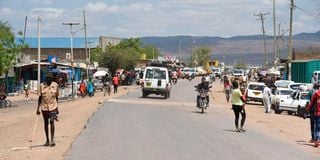Alarm over cholera outbreak in Kakuma and Kalokol towns

Kakuma town in Turkana County on September 20, 2021. Cholera outbreak has been reported in the town.
Health authorities have raised alarm over cholera outbreak in Kakuma and Kalokol towns in Turkana County.
Cholera outbreaks have been a recurring public health concern in the county.
Despite support from development partners, Turkana County continues to grapple with lack of toilets and poor access to clean drinking water.
Statistics from the County Department of Health indicated that lack of toilets and poor sanitation hygiene in 2018 resulted in the death of three people and 78 others hospitalized.
A year later in May, Turkana West sub-County recorded more than 20 confirmed cases of cholera at both the Kakuma Refugee Camp and neighbouring villages due to poor sanitation that was worsened by rains.
"At the moment, we are experiencing heavy rains in most parts of the county, especially Kakuma town where cases of open defecation are on the rise. I appeal to both refugees and the host community to make good use of available toilets and either treat or boil drinking water as a precautionary measure," Turkana County Health Executive Joseph Epem said.
Mr Festus Muya, a Kakuma resident said that they are exposed to recurring outbreaks of cholera because development partners don't have a sustainable plan to address water scarcity.
He said that for a long time, the host community in Turkana West have complained that refugees are treated better than them with enough food rations, better access to safer water and better health services.
"Despite this fact, many Non-Governmental Organizations have been heavily investing in the refugee camp but lack of a sustainable plan has seen forced refugees to also turn to scoop holes at the seasonal Tarach river for unsafe water," Mr Muya said.
Mr Evans Pasua, Community Service Officer at Kenya's Department of Refugee Affairs testified that the USAID funding cuts have been widely felt in Kakuma Refugee Camp due to the current humanitarian crisis.
"We fear the situation could worsen with more people exposed to cholera outbreak unless new funding sources are secured. We are already seeing the effects. Families are eating less, and there is rising tension between the host community and refugees because of the scarcity of basic commodities like food and water," Mr Pasua said.
He said that a section of refugees are being supported by new funding from the Rahma Worldwide humanitarian organisation.
"The organisation has supported 500 vulnerable families with food supplies like cooking oil, rice, beans, wheat flour, maize flour, and salt as well as 200-litre tanks for 200 families that they will rely on to store clean water during this rainy season," Mr Pasua said.
One of the beneficiaries, Ms Mezinkimana Nkasiri, said that most of them lack water storage tanks forcing them to only fetch less than 40 litres of clean water whenever there is water trucking.
"With much bigger water tanks we are assured of storing clean water so that we are safe from diseases related to untreated water from scoop holes," Ms Nkasiri said.
Kalokol town on the shores of Lake Turkana is also at risk of a cholera outbreak due to the limited number of toilets and lack of access to piped water, which has forced residents to rely on unsafe water from Napasinyan River.
Mr Daniel Lokaale said that they are yet to benefit from the county government and North Rift Water Works Authority plans to end long standing water challenges at Kalokol by extending the water pipeline from Eliye centre.
"We recently enjoyed water from the pipeline for a month. Though salty, it was a sign that Kalokol water woes could be solved. It was later discovered that a section of the pipe was destroyed and they have not repaired it again," he said.
Mr Lokaale said that besides Kalokol town, Longech Island and Namukuse villages along the shores of Lake Turkana are also at risk of cholera outbreaks.


